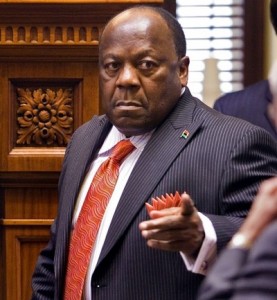At the heart of the ethical argument are the choices we make in life; positive or negative – and the consequences of where those actions lead.
 In an article by Tim Smith (November 14, 2014) for the Greenville (SC) News, we hear the sad news of former State Senator Robert Ford. Ford was the senator from Charleston, but this could pertain to most anyone in any city in America. He was charged with eight criminal accounts in May of 2013. According to the article:
In an article by Tim Smith (November 14, 2014) for the Greenville (SC) News, we hear the sad news of former State Senator Robert Ford. Ford was the senator from Charleston, but this could pertain to most anyone in any city in America. He was charged with eight criminal accounts in May of 2013. According to the article:
“The grand jury indicted Ford on Friday, accusing him of misusing his campaign account by depositing campaign funds in his personal account, using campaign funds for personal expenses, and filing false campaign reports to the Senate Ethics Committee…
“Ford is charged with one count of misconduct in office, two counts of personal use of campaign funds, two counts of depositing campaign contributions into personal bank accounts, two counts of false reporting and one felony count of forgery less than $10,000, according to Wilson’s office.”
Mr. Ford had been in office since 1993, and was obviously was well-respected before he was forced to resign. It is a sad case and a terrible shame.
What is most interesting to me is not the indictment in and of itself, but the “back story.” Please note that the italics are mine:
“Friday’s indictment as well as the guilty plea last month by former House Speaker Bobby Harrell to ethics charges should help push lawmakers to enact an ethics reform bill next year that has failed thus far to pass the Legislature, said Sen. Larry Martin of Pickens, chairman of the Senate Judiciary Committee and an advocate for ethics reform.”
Ford could be looking at as much as 10 years in prison plus fines. Of course he has pled innocent. Shame is a bitter pill.
What happened and why it was allowed to happen
My first comment has absolutely nothing to do with Robert Ford. It is a “why” question: why wouldn’t lawmakers want to enact an ethics reform bill? What is so frightening about ethics? Why should our politicians live by a code of conduct? Republican, Democrat, Green Party or Macaroni and Cheese Party, why shouldn’t we expect our politicians to adhere to a certain set of standards? When the lawmakers did not want to enact an ethics reform bill, where was the citizenry? Where were “we?” Why wasn’t there outrage from all of the electorate? I don’t much care what party you support, I just want the people you support to be honest and ethical. Again, this seems a case of we-the-people shrugging our collective shoulders and giving up on our own system. I am not blaming “us” for men such as Ford to allegedly commit these crimes; I am blaming us for our lack of interest.
However there is a much larger issue in play here. If there are opportunities for an unethical person to make poor choices and there are no checks and balances in place, there will be the opportunity for wrong-doing.
Ford came into office in 1993, and over the years he might have been able to circumvent the system for his own gain. Twenty-one years in office is a long time; twenty-one years can lead an unethical person into seeing flaws and “hidden corners” in any system.
At some point, he was tempted to cross a line because no system had been put into place to insure a “fire wall” between campaign contributions and personal bank accounts. No one supervised where the funds were to go and no third party filtered the transactions such that authorizations and signatures would need to be verified.
Because no system was in place, unethical temptations night have crossed over into unethical realities – the door became wide open and Ford allegedly walked through that door. It undoubtedly might have started with a small temptation; maybe just a few bucks here and there to “test the organization” to see if anyone cared; no one did.
As with most people who get caught doing something unethical, I seriously doubt he started as a “bad person.” I am also sure that along the way he did many fine things however, because no policies, checks and balances were in place and because no ethical expectations were established, he was able to go down a different road.
If he sees the inside of a jail cell, Robert Ford will fully understand that bad consequences are always the end result of bad choices. It never fails to work out that way.

